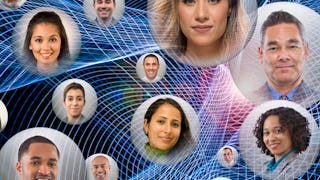Machine Learning vs. Statistics: What’s the Difference?
March 4, 2025
Article



This course is part of Computational Social Science Specialization

Instructor: Martin Hilbert
16,070 already enrolled
Included with 
(342 reviews)
(342 reviews)
Examine the history and current challenges faced by Social Science through the digital revolution.
Configure a machine to create a database that can be used for analysis.
Discuss what is artificial intelligence (AI) and train a machine.
Discover how social networks and human dynamics create social systems and recognizable patterns.

Add to your LinkedIn profile
5 assignments



Add this credential to your LinkedIn profile, resume, or CV
Share it on social media and in your performance review

This course gives you an overview of the current opportunities and the omnipresent reach of computational social science. The results are all around us, every day, reaching from the services provided by the world’s most valuable companies, over the hidden influence of governmental agencies, to the power of social and political movements. All of them study human behavior in order to shape it. In short, all of them do social science by computational means.
In this course we answer three questions: I. Why Computational Social Science (CSS) now? II. What does CSS cover? III. What are examples of CSS? In this last part, we take a bird’s-eye view on four main applications of CSS. First, Prof. Blumenstock from UC Berkeley discusses how we can gain insights by studying the massive digital footprint left behind today’s social interactions, especially to foster international development. Second, Prof. Shelton from UC Riverside introduces us to the world of machine learning, including the basic concepts behind this current driver of much of today's computational landscape. Prof. Fowler, from UC San Diego introduces us to the power of social networks, and finally, Prof. Smaldino, from UC Merced, explains how computer simulation help us to untangle some of the mysteries of social emergence.
In this module, you will be able to examine the history and current challenges faced by social science through the digital revolution. You will be able to discuss the mystery at the core of society: social emergence. You will be able to recall the fundamental building blocks of the scientific method and how they apply to the new computational tools we now have available. You will be able to defend what people mean when they say that ‘social studies’ are currently maturing to become a ‘real science’.
14 videos3 readings1 assignment2 discussion prompts
In this module, you will be presented with an example of how computational social science is applied in the real world through a case study. You will be able to discuss examples of digital footprint and describe how computational social science is applied. You will practice an activity and be able to configure a machine to create a database that can later be used for analysis.
7 videos3 readings2 assignments1 peer review
In this module, you will be able to discover how artificial intelligence can convert news stories into a real-time observatory of global unrest and potential terror attacks, and how brain scans can be used to reveal aspects of your moral values. You will be able to practice interacting with artificial intelligence that can interpret your art skills.
7 videos1 reading1 assignment1 discussion prompt
In this module, you will be able to discover how social networks and human dynamics create systems that are larger than you and me: social systems. You will be able to discuss how social networks and human dynamics follow recognizable patterns. You will be able to identify how social network analysis and computer simulations are currently quite successful in untangling some of the mysteries of social emergence.
10 videos1 assignment1 discussion prompt
We asked all learners to give feedback on our instructors based on the quality of their teaching style.



UC Davis, one of the nation’s top-ranked research universities, is a global leader in agriculture, veterinary medicine, sustainability, environmental and biological sciences, and technology. With four colleges and six professional schools, UC Davis and its students and alumni are known for their academic excellence, meaningful public service and profound international impact.

University of California, Davis
Specialization

University of California, Davis
Course

Johns Hopkins University
Course

University of California, Davis
Course




342 reviews
79.82%
14.03%
2.04%
2.04%
2.04%
Showing 3 of 342
Reviewed on Aug 6, 2022
Great lectures and quite nice foundation for starting this field, recommendation.
Reviewed on Jul 11, 2020
This is a great course to take as an introduction to Computational Social Science. I hope the rest of the Specialization is just as engaging, relevant, and informative.
Reviewed on Feb 24, 2023
This course is an introduction to many revolutionary methods in social sciences that can have profound results in our life. Strongly recommended.

Unlimited access to 10,000+ world-class courses, hands-on projects, and job-ready certificate programs - all included in your subscription
Earn a degree from world-class universities - 100% online
Upskill your employees to excel in the digital economy
These are some of the reflections shared by students who have worked through the content of the Specialization on Computational Social Science:
"Highly enjoyable and most importantly, giving me exceptionally important skills to fulfill my job requirements at a new position in Munich. You may be interested to know the impact of your course on salary and in my case, the knowledge and certification gained adds about another Euro 20.000 on the annual salary (taking it to about Euro 120.000 p.a.)."
"My overall impression of this was: I can't wait to use this for other stuff!!"
"I absolutely think that these tools could be used in my future jobs, or even as a personal reflection. If you scrape and analyze the comments/reactions that your business gets on Youtube, Twitter, Instagram, etc., what does their language use say about how they interact with your brand — or what your brand brings out in them?"
"Wow, this is cool and fun stuff. Even though I may not pursue anything social-science related in the near future, it is still nice to learn and get to experience all of these tools that computational social science offers and benefits in all kinds of careers and fields of study."
"I particularly enjoyed the web-scraping for some reason. It feels very advanced although its very easy. ...It seems to be a very fast and efficient way of grabbing data."
"I enjoyed playing around with machine learning! ...It was also amazing to me how quickly it was able to grasp and learn our input in seconds. It makes me wonder how much more technology will advance in these next few years... It's scary but fascinating."
"The fact that these tools are so easily usable and attainable is incredible in my mind. Not only do we have access to them like we have access to things like Facebook and Twitter, but they're FREE."
"The most interesting aspect was the fact that these tools are all free and online. In the past, only researchers at well-funded universities had access to programs like the ones we used in all of our labs. But now, even someone without much technical knowledge on complex software can use these tools."
"I am so surprised that these tools are available to anyone through a simple download, and even more so that they are very user friendly and easy to learn how to navigate. I plan on starting a clothing line company in the future and I think it will be really helpful for me to be able to analyze so much online data."
"As an Environmental Policy Analysis and Planning major, I was fascinated to learn that there is a feasible way to simulate policy implementation and impact multiple times within a short span of time."
"UCCSS has allowed me to feel more confident in my abilities with a computer and to better understand companies like Facebook or Twitter. ...these tools really are powerful but also dangerous. ...It allows powerful individuals to manipulate ideas."
"Throughout the course, the content was challenging, but when it was finally applied to the labs at the end of each module, it was really rewarding to see everything play out. It was even more rewarding when it made sense too! ... I'm really glad I took this course! It was definitely a challenge, but I'm glad I got to experience and learn about so many topics I never knew even existed."
"It was fun seeing the results of the code that I made, and I never thought that I would be doing something like this in my life. The results also showed me what the society would look like.... Social network analysis and web scraping could be the tools that I use in my future job as all the internship that I'm looking now all related to social media or digital media."
"My career aspiration is to be a digital marketing expert. These computational tools have enormous implications for the field."
"I really really loved that this class let me learn hands-on and gave me experience with tools that have real world application and combine STEM & social science. I think that a lot of these tools are useful far beyond homework activities."
"Best course I have taken. I wish more online courses structured like this would be offered."
This Specialization on Computational Social Science is the result of a collective effort with contributions from Professors from all 10 campuses of the University of California. It is coordinated by Martin Hilbert, from UC Davis, and counts with lectures from:
1) UC Berkeley: Joshua Blumenstock, Prof. iSchool; Stuart Russell, Professor of Computer Science and Engineering.
2) UC Davis: Martin Hilbert, Prof., Dpt. of Communication & Seth Frey, Prof., Dpt. of Communication & Cynthia Gates, Director of the IRB.
3) UC Irvine: Lisa Pearl, Prof. Cognitive Sciences.
4) UC Los Angeles: PJ Lamberson, Assistant Prof. Communication Studies.
5) UC Merced: Paul Smaldino, Prof. Cognitive and Information Sciences.
6) UC Riverside: Christian Shelton, Prof. Computer Science.
7) UC San Diego: James Fowler, Prof. Global Public Health and Political Science.
8) UC San Francisco: Maria Glymour, Associate Prof. School of Medicine, Social Epidemiology & Biostatistics.
9) UC Santa Barbara: René Weber, Prof. Dpt. of Communication & Media Neuroscience Lab (with Frederic Hopp).
10) UC Santa Cruz: Marilyn Walker, Prof. Computer Science, Director, Computational Media.
Access to lectures and assignments depends on your type of enrollment. If you take a course in audit mode, you will be able to see most course materials for free. To access graded assignments and to earn a Certificate, you will need to purchase the Certificate experience, during or after your audit. If you don't see the audit option:
The course may not offer an audit option. You can try a Free Trial instead, or apply for Financial Aid.
The course may offer 'Full Course, No Certificate' instead. This option lets you see all course materials, submit required assessments, and get a final grade. This also means that you will not be able to purchase a Certificate experience.
When you enroll in the course, you get access to all of the courses in the Specialization, and you earn a certificate when you complete the work. Your electronic Certificate will be added to your Accomplishments page - from there, you can print your Certificate or add it to your LinkedIn profile. If you only want to read and view the course content, you can audit the course for free.
If you subscribed, you get a 7-day free trial during which you can cancel at no penalty. After that, we don’t give refunds, but you can cancel your subscription at any time. See our full refund policy.
Yes. In select learning programs, you can apply for financial aid or a scholarship if you can’t afford the enrollment fee. If fin aid or scholarship is available for your learning program selection, you’ll find a link to apply on the description page.
Financial aid available,
Learn on your own time from top universities and businesses.
Already on Coursera?
Having trouble logging in? Learner help center
This site is protected by reCAPTCHA Enterprise and the Google Privacy Policy and Terms of Service apply.